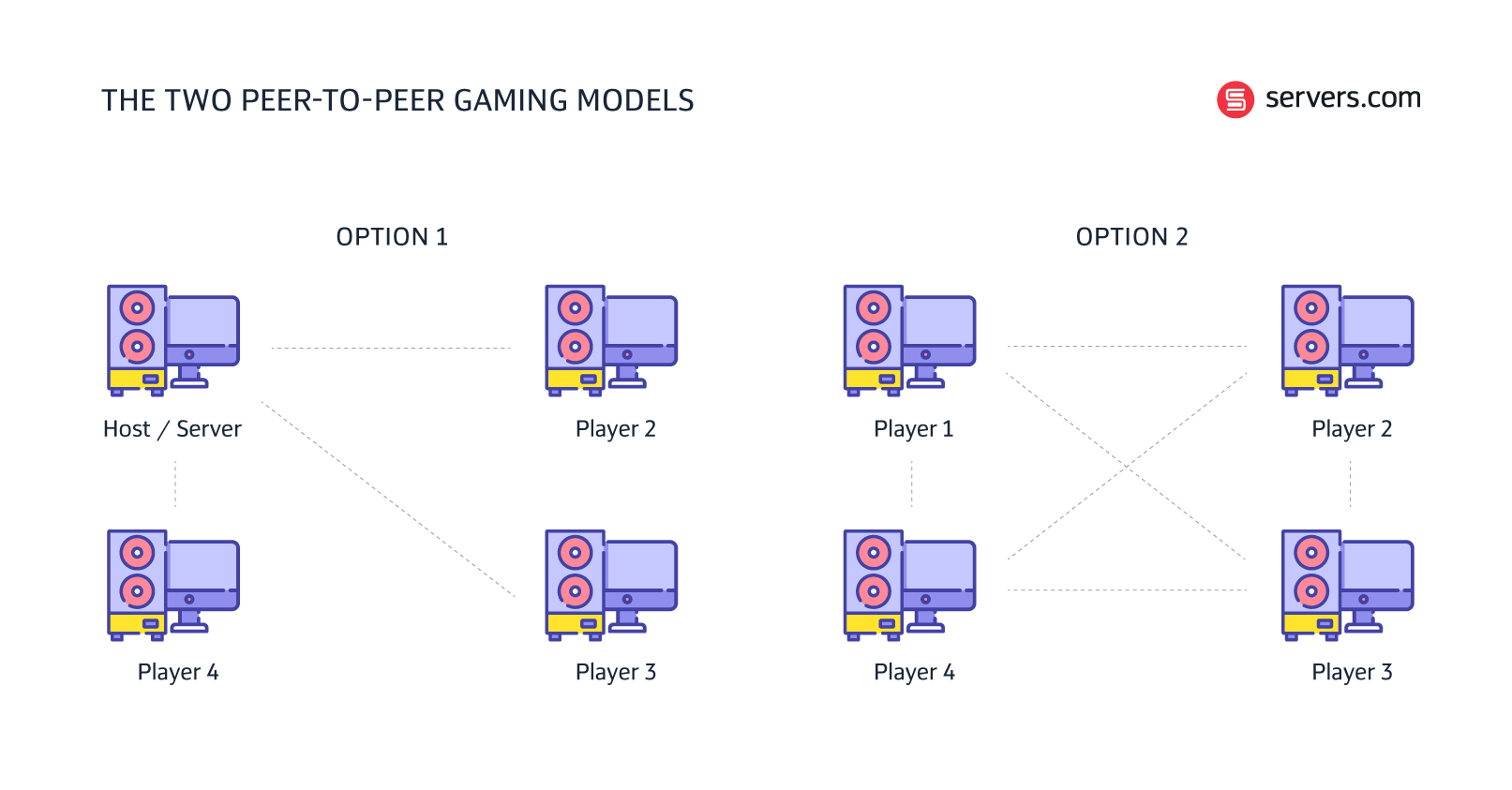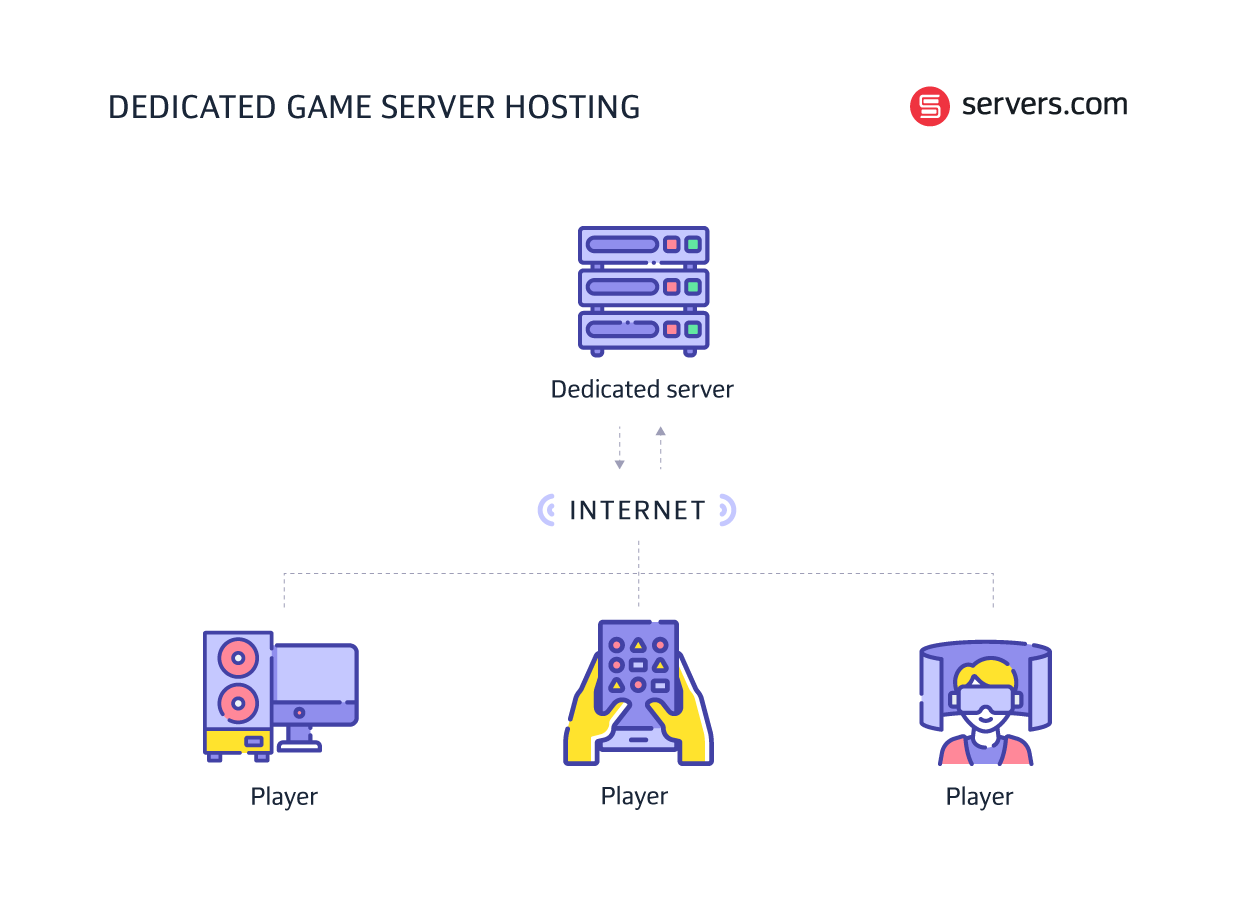

Have you ever been frustrated with the smallest of lags in a multiplayer game? Or felt like you might have made that last shot, had your connection been just a fraction quicker?
Gamers, we feel your pain. It’s understandable to feel hindered by a game-side issue, especially in massive multiplayer games where every millisecond counts.
Although your personal broadband speed may sometimes be responsible for these delays, it could be that the game you’re playing is hosted on a peer-to-peer gaming server, rather than a dedicated gaming server.
Whether you’re assessing the differences between gaming server types, or just want to further your understanding of gaming server terms, read on to learn more about the differences between peer-to-peer vs dedicated server hosting.
Peer-to-peer gaming (sometimes called peer 2 peer, or P2P), refers to a multiplayer game that is hosted by one of the players’ machines, whether that be a PC or a gaming console.
A peer-to-peer gaming network structure usually works best in games where players are near to one another. This means that your connection will be better the closer other players are to you. If you play peer-to-peer games on a global level, chances are your connection will be much slower than you need.
Some examples of P2P games include:
Animal Crossing: New Horizons
Super Smash Bros. Ultimate
GTA Online
Demon’s Souls
There are two types of network structures that commonly occur in peer-to-peer gaming. First, a sole player or ”host” acts as the server for the rest of the players. Those players connect to the host who relays data to every player that’s connected to them.
Another form of peer-to-peer gaming is where everyone on the connection is needed to maintain the network. Once the connection is established, the network of computers then sends messages to one another to disseminate and balance the amount of work necessary to keep the game up and running.

Cost - the cost savings of not having to maintain a dedicated game server make it a favorable choice for multiplayer indie games.
Network model - there is no reliance on a single server.
Dependence on player connections - the main issue with peer-to-peer gaming is its reliance on players having sufficient internet speeds, usually within their homes. As the past couple of years have proven to us all, home broadband speeds aren’t always up to the task.
Dependence on the host - players can also face issues with the “host” we discussed earlier. If the player designated as host leaves the game, or their connection is poor, this can have a knock-on effect on the quality of the other players’ gameplay, and sometimes even end the game altogether.
Host advantage – the “host” of the peer-to-peer gaming server has a definite advantage on the other gamers; they have almost zero ping, which is not what you want in a competitive game.
Security concerns - as peer to peer gaming is susceptible to sabotage from players who can deliberately introduce lag when there is no central authority in the form of a neutral server.
A game server refers to the application instance loaded onto a dedicated server, which runs the server side of a multiplayer game—in other words, the software.
This is not to be confused with dedicated gaming servers, which are the physical underlying bare-metal machines and are used for hosting a game server.
Ideal for high workloads, dedicated gaming servers are behind some of your favorite multiplayer games, including:
Minecraft
7 Days to Die
Counter Strike: Global Offensive
Rust

Ideal for synchronous multiplayer games (SMGs) - dedicated gaming servers are a particularly popular option for synchronous multiplayer games (SMGs), as they require a lot of infrastructure to support all the real-time action.
The control of resource, power and connectivity available to dedicated gaming server hosts make dedicated gaming servers the preferred choice for SMGs.
This is because it allows the players to play the game at the same time, and for their actions to be almost immediately reflected on the other players’ screens.
Control - dedicated gaming server hosting allows control over how many players can join the game, or restrict users from joining the server if they break the rules.
Customization - dedicated gaming servers also allow the game rules to be customized - for instance, the number of rounds, or the conditions of winning can be tailored.
|
Features |
P2P gaming model |
Dedicated gaming server |
|
Control |
Control over setting up the P2P network |
Control over player access and behavior |
|
Customization |
Players can customize game rules and settings |
Game studios can customize rules and settings |
|
Security |
At risk from sabotage by other players |
Greater protection again cheating and malicious actors |
|
Cost |
Low cost making it accessible to everyone |
Cost-effective for baseline CCU |
|
Reliability |
Dependent on internet connection and other players |
Dedicated server resources provide a reliable gaming experience |
If low costs are important, or if a peer-to-peer game is designed to be played in close proximity with others, then peer-to-peer gaming servers may be the right choice.
However, the drawbacks of peer-to-peer gaming such as the reliance on one player to assume the role of “host” and therefore their internet speeds, or the almost certain advantage the “host” will enjoy thanks to almost zero ping, mean that peer-to-peer gaming servers may not be suitable.
Dedicated gaming servers, however, are ideal for developers looking to mitigate the performance issues that often come with less reliable hosting set-ups, such as lag, slower loading times, lost files, interrupted games and crashes.

Hannah is an experienced communications professional, with a decade-long career developing memorable campaigns for some of the world's biggest technology companies. She has a keen eye for detail and flair for creativity.